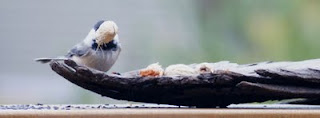
Near sunset.
We admired the bird tracks
in the snow zig-zagging
beneath the feeder.
I wonder what maneuver
made the wings on this
snow angel?


 A group of Eastern Bluebirds Sialia Sialis, darted in and out of the Black Chokeberry Aronia melanocarpa bushes. Surmising these bluebirds might be the two broods that fledged out of our nestbox this summer plus the adults, we smiled and watched as they flew around at the edge of the woods. Then, as the bluebirds moved off towards the cattails, a flock of Cedar Waxwings Bombycilla cedrorum appeared and settled in to savor the black leathery chokeberries. Their grey and buff coloring might help them go unnoticed, but their yellow tail-tips were bright accents among the burnished chokeberry leaves.
A group of Eastern Bluebirds Sialia Sialis, darted in and out of the Black Chokeberry Aronia melanocarpa bushes. Surmising these bluebirds might be the two broods that fledged out of our nestbox this summer plus the adults, we smiled and watched as they flew around at the edge of the woods. Then, as the bluebirds moved off towards the cattails, a flock of Cedar Waxwings Bombycilla cedrorum appeared and settled in to savor the black leathery chokeberries. Their grey and buff coloring might help them go unnoticed, but their yellow tail-tips were bright accents among the burnished chokeberry leaves. The birds are gathering into their winter "guild". Several of the woodpeckers are back again -- the Downy Woodpecker Picoides pubescens, the Hairy Woodpecker Picoides villosus, Red-bellied Woodpecker Melanerpes carolinus, and the big Pileated Woodpecker Dryocopus pileatus. This Red-bellied Woodpecker helped himself to sunflower and safflower seeds.
The birds are gathering into their winter "guild". Several of the woodpeckers are back again -- the Downy Woodpecker Picoides pubescens, the Hairy Woodpecker Picoides villosus, Red-bellied Woodpecker Melanerpes carolinus, and the big Pileated Woodpecker Dryocopus pileatus. This Red-bellied Woodpecker helped himself to sunflower and safflower seeds.



 My gardens are surrounded by neighbors' flowery landscaped yards, one of which probably threw seeds to the wind for this result.
My gardens are surrounded by neighbors' flowery landscaped yards, one of which probably threw seeds to the wind for this result.

 The kitchen garden at the edge of the wild woods produces a precarious harvest of veggies when the grazing deer stay outside the rabbit fence. On most afternoons there are just enough tomatoes, summer squash, beans, snow peas, or leafy greens ripe for our small suppers.
The kitchen garden at the edge of the wild woods produces a precarious harvest of veggies when the grazing deer stay outside the rabbit fence. On most afternoons there are just enough tomatoes, summer squash, beans, snow peas, or leafy greens ripe for our small suppers.


